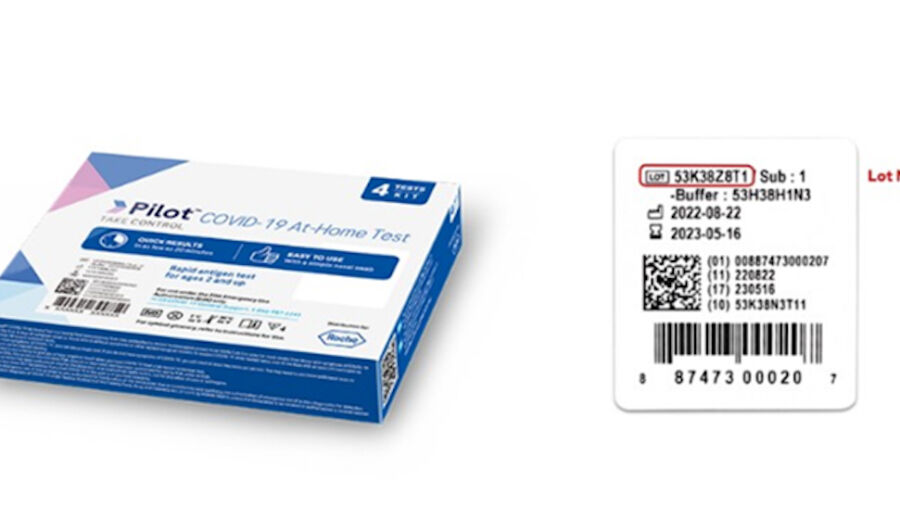The FDA issued a warning to consumers on Thursday to stop using a certain COVID-19 at-home test due to the potential for bacterial contamination in the product’s liquid solution.
In a bulletin, the FDA warned consumers and medical care providers “to stop using and toss out certain lots of recalled SD Biosensor, Inc. Pilot COVID-19 At-Home Tests, distributed by Roche Diagnostics.”
The agency said it has “significant concerns of bacterial contamination” in the liquid solution that comes with the kit. “Direct contact with the contaminated liquid solution may pose safety concerns and the bacterial contamination could impact the performance of the test,” the FDA said, issuing a “do no use” warning to users.
The FDA said that the product could be contaminated by Enterococcus, Enterobacter, Klebsiella, and Serratia bacterial species. Infection from those types of bacteria could cause illness in individuals with weakened immune systems or those who have direct exposure to the contaminated liquid test solution via misuse, accidental spills, or “standard handling” of the product.
Aside from developing an infection, the contaminated products may also produce “false-negative” or “false-positive” antigen test results, the FDA said, which could lead to a variety of problems. For example, according to the FDA, a false-negative test could result in an individual seeking treatment for COVID-19.
SD Biosensor has initiated the recall for the at-home tests to certain retailers across the United States, according to the FDA announcement.
Some 500,000 tests were distributed through CVS Pharmacy as well as about 16,000 tests that were sent via Amazon. It’s not clear how many were sold to consumers, the FDA said, adding that it is “working with Roche” to determine the number.
Recall Notice – SD Biosensor, Inc. Requests Discontinuation of Use and Disposal of Specific Pilot™ COVID-19 At-Home Tests in the United States Due to Microbial Contamination in the Liquid Buffer Solution https://t.co/xb6GXGrOv8 pic.twitter.com/Ub9evKKHaJ
— U.S. FDA Recalls (@FDArecalls) May 5, 2023
“Importantly, none of the impacted lots were distributed through COVID.gov/tests – Free at-home COVID-19 tests or as part of other federal testing programs,” the agency said. “If you received your tests through the COVID.gov/tests distribution or as part of other federal testing programs, they are not subject to this safety communication or product recall.”
Roche Responds
Roche, in a statement, said that the recalled test kits can be identified by the lot number on the product’s outer packaging. A list of affected lot numbers is available on Roche’s website.
It also issued a warning to consumers on what to do—and what not to do—with the recalled kits.
“Dispose of the entire test kit in the household trash,” it advised. “Do not pour the liquid down the drain.”
The company then warned that “direct exposure to the liquid in the tube through misuse or spillage could potentially lead to serious illness.” However, no such illnesses have been reported, the statement said.
“If the liquid in the tube contacts your skin and eyes, flush with large amounts of water and if irritation persists, seek medical attention,” the company added. “Individuals performing the self-test may run the risk of direct contact with the contaminated liquid in the tube,” Roche also said.
It added: “The liquid is contained in an individual, ready-to-use, pre-filled and sealed tube, but a user may inadvertently come in direct contact with the contaminated liquid during opening the tube or handling of the open tube or while performing the test.”
Evie Baik, a spokesperson for SD Biosensor, told CBS News that the contamination may have come from raw materials from one of their suppliers. The spokesman didn’t elaborate.
“To date, no such illness has been reported, and to date, no impact on performance has been confirmed,” Baik said.
The FDA said it is now reviewing the SD Biosensor test kit recall and is working to classify the recall risk. The agency will now work with SD Biosensor to assess the company’s actions to address the reason for bacterial contamination and to figure out how to resolve the incident.
According to Roche’s website and the FDA, the kit was approved via the FDA’s emergency use authorization process but hasn’t been fully cleared or approved by the federal regulator.
From The Epoch Times

